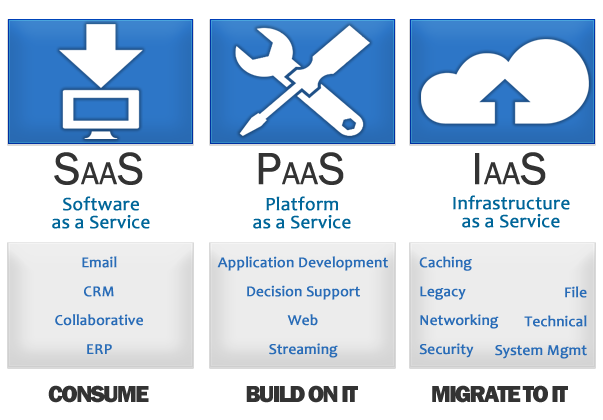Evolution of Cloud Computing
Cloud computing is the delivery of computing services built on decades of research in virtualization, distributed computing and networking services. It implies a service-oriented architecture, databases, servers, storage, networking and software. It reduces total cost of ownership, on-demand services, and many other things.
Types of cloud computing:-
Cloud computing services fall under three different kinds of categories: Infrastructure as a service (IaaS) , Platform as a service (PaaS) and Software as a service (Saas).
Infrastructure-as-a-service (IaaS):-
The most basic category of cloud computing services. IaaS means you're buying access to raw computing hardware over the Net, such as storage/servers. This is also referred to as utility computing because you buy what you need and pay-as-you-go.
Example:- Ordinary web hosting. you pay a per-megabyte/gigabyte fee or a monthly subscription to have a hosting company serve up files for your website from their servers .
Platform as a service (PaaS):-
With help of PaaS developers can quickly create mobile or web applications without managing the infrastructure of servers, networks and databases or worry about development needed for development. This means that you develop applications using web tools to run on software and hardware provided by another company.
Example: - You can develop your own e-commerce website, but you have everything you need, including the shopping cart, payment and payment mechanism on the merchant's server.
Software as a service (SaaS):-
is a method of delivering software applications on the Internet , on demand and usually by subscription. Saas manage and the software application and manage any maintenance, such as software upgrades and security patches.
It simply means you use a complete application running on someone else's system. Best -known examples are perhaps Web-based email and Google Documents.
Top benefits of cloud computing :-
Here are six common reasons why organizations are turning to cloud services:
1. Cost
Cloud computing eliminates capital expenditures related to the purchase of hardware and software and the configuration and operation of on-site data centers - server arrays, 24-hour electricity for power and cooling systems. It adds up fast.
2. Speed
Most cloud services are on-demand/self-service, so even requirement of vast amounts of IT resources can be provisioned in minutes.
3. Global scale
The benefits of cloud computing services include the ability to evolve elastically. In the cloud, this means providing the amount of appropriate computing resources, for example, more or less computing power, storage, bandwidth when needed and from the appropriate geographic location.
4. Productivity
On-site data centers usually require a lot of software configurations, hot fixes, and other tedious IT management tasks. Cloud computing discards the need for many of these tasks so that IT teams can implement their precious time on achieving larger business goals.
5. Performance
The largest cloud services operate on a global network of secure data centers, which are regularly upgraded to the latest generation of fast and efficient hardware. This gives several benefits over a single enterprise data center, including greater economies of scale and reduced network latency for applications.
6. Reliability
Cloud computing facilitates and simplifies data backup, disaster recovery, and business continuity because data can be mirrored across multiple redundant sites in the cloud provider's network.
If you are looking for Best Cloud computing training in chandigarh than Join CBitss technologies . This is the best training institute in chandigarh .










I believe there are many more pleasurable opportunities ahead for individuals that looked at your site.
ReplyDeleteaws training in chennai
selenium training in chennai
simply superb,mind blowing, i will share your blog to my friends also
ReplyDeleteAWS Online Course Hyderabad
In this interview Erik, the CEO, shares his thoughts on why they decided to go remote, what challenges they encountered and how they addressed them, as well as what qualities a developer should possess to become a part of chess .com team.
ReplyDelete